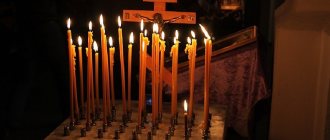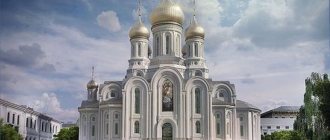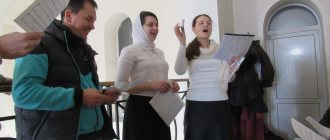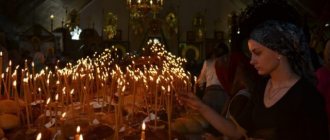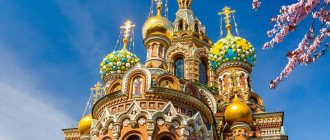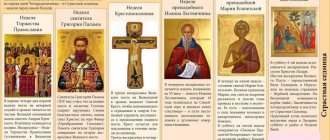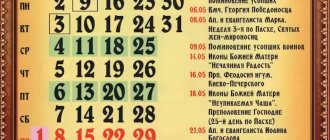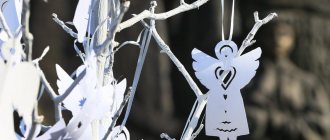Russian Orthodox Church
print version
5th week of Easter, about the Samaritan.
17. 5th Sunday after Easter, about the Samaritan. Voice 4th.
Ap. Andronik and others like him. Mch. Nicholas of Bulgaria. St. Euphrosyne, in the world of Evdokia, led. book Moscow (service on July 7).
Note.
The hymns of the Week about the Samaritan are sung over four days: on Sunday, Thursday, Friday and Saturday, since on Monday and Tuesday the service of the Midsummer is celebrated, and on Wednesday the celebration of the Midsummer (cf.: Typikon, ch. 50, “Week 5th according to Pascha, Samaritans").
The Sunday service, Midsummer and Samaritans is performed according to the Triodion.
At Great Vespers
“Blessed is the man” - all kathisma.
On “Lord, I have cried” stichera for 10: Sunday, tone 4 - 4 (see in the Triodion), Half-Half, the same tone (see on Tuesday of the 4th week of the evening) - 3, Samaritans, tone 1 and voice 2 – 3. “Glory” – Samaritans, voice 6: “When the student Jacob…”, “And now” – dogmatist, voice 4: “For Your sake...”.
Entrance. Prokeimenon of the day.
At the litany of the stichera of the temple. “Glory, even now” – Samaritans, voice 3: “Let him rejoice today...”.
On the stichera there is the Sunday stichera, tone 4: “Lord, having ascended to the Cross...”, and the Easter stichera, tone 5 (with their refrains). “Glory” - Samaritans, tone 8: “When you appeared...”, “And now” - Easter, tone 5: “Resurrection day...” (at the end “Christ is risen...” - once, as the end of the stichera) .
According to the Trisagion - “To the Virgin Mary...” (three times).
Note.
The Typikon does not say anything about the singing of troparions at Vespers on this day, limiting itself to a general indication: “...And all the rest, as prescribed in the other Weeks” (see: Typikon, chapter 50, “5th Sunday after Passover, Samaritans”), which gives the right to sing the troparion “To the Virgin Mary” (three times) at the blessing of the loaves, although this Week is the after-feast of Mid-West (cf.: Typikon, ch. 50, “4th Week after Passover, relaxed” and “3rd Week after Pasce, the Holy Myrrh-Bearing Women and Joseph the Righteous").
At matins
on “God is the Lord” – the Sunday troparion, tone 4: “The bright resurrection sermon...” (twice). “Glory, even now” - the troparion of the Mid-Half, tone 8: “I am half-hearted for the holiday...”.
Kathismas 2nd and 3rd. Small litanies. Sunday sedals (see in Triodion).
Blameless[91]. "Angelic Cathedral..." Ipakoi, voice 4: “Even of Your glorious rising...”. Degrees - antiphons of the 4th tone. Prokeimenon, tone 4: “Arise, Lord, help us...” Sunday Gospel 7th. “Having seen the Resurrection of Christ...” (three times). According to Psalm 50: “Glory” - “Through the prayers of the apostles...”. Sunday stichera, tone 6: “Jesus is risen from the grave...”.
Canons: Easter with Irmos and Mother of God for 6 (irmos twice), Mid-Poloveniya (2nd) for 4 and Samaritans for 4.
Bible songs “We sing to the Lord...”.
Easter Catavasia: “Resurrection Day...”
According to the 3rd hymn – kontakion and ikos of the Midsummer, tone 4 (see Wednesday of the Midsummer); Samaritan's seat, the same voice: “Let Heaven rejoice...”. “Glory, even now” - the sedal of the Midsummer, the same voice: “To the Giver of Wisdom...”.
According to the 6th song - the kontakion of the Samaritan woman, voice 8: “By faith the Samaritan woman came to the well...”, and ikos, the same voice: “We will hear the pure sacrament...”.
I won’t sing “The Most Honest” for the 9th song. (The usual incense is performed.)
According to the 9th song - “Holy is the Lord our God.” Exapostilary of Easter: “Having fallen asleep in the flesh...” “Glory” is the luminary of the Samaritans: “You came to Samaria...”, “And now” is the luminary of Midlife: “When you were halfway through you came...”.
“Every breath…” and psalms of praise.
On the praises there are stichera for 8: Sunday, tone 4 - 6, and Samaritans, tone 3 and tone 6 - 2[92]. “Glory” – Samaritans, voice 6: “The source of life…”, “And now” – “Most blessed art thou...”.
Note.
This order of singing the stichera is prescribed in the Tsvetnaya Triodion. The Typikon's instructions on the stichera of praise for this Week (Sunday - 5, Samaritan - 3) repeat the old printed editions of the Charter and do not correspond to the composition of the texts in the modern Colored Triodion. V. Rozanov believes that there is a typo in the current Typikon, and one must follow the instructions of the Colored Triodion (see: V. Rozanov. Divine Service Charter of the Orthodox Church. pp. 680–681).
Great doxology. According to the Trisagion - the Sunday troparion: “Risen from the grave...”.
Before the 1st hour on “Glory, and now” - the Gospel stichera, tone 7: “Behold darkness and early...”.
On the clock
- Sunday troparion. “Glory” is the troparion of Midnight. The kontakia of the Midsummer and the Samaritans are read alternately.
At the Liturgy
blessed voices - 4 (see in the Triodion), Samaritans, hymn 3 - 4, and Midsummer, 2nd canon hymn 6 - 4.
At the entrance - the Sunday troparion, the troparion of the Midsummer. “Glory” is the kontakion of the Samaritan, “And now” is the kontakion of the Midsummer.
Prokeimenon – Weeks of the Samaritan, tone 3: “Sing to our God, sing…”; verse: “Wrap all the nations with your hands...”
The Apostle and the Gospel - Weeks about the Samaritan.
Alleluia - Weeks of the Samaritan, tone 4: “Come on, and succeed, and reign...”; verse: “Thou hast loved righteousness...”
Honorer of Easter.
Communicated - Easter: “Receive the Body of Christ...”; and day (Sunday): “Praise the Lord from Heaven...”.
The 118th psalm (17th kathisma) is sung in the 5th tone, regardless of the weekly tone, and immediately after it the troparia “The Council of Angels...”. In parish practice, the polyeleos are usually sung instead of the Immaculates at Sunday all-night vigils. For the choruses to the last two stichera of praise, see the Triodion. Verse 1: “Come on, and succeed, and reign, / for the sake of truth, and meekness, and righteousness”; Verse 2: “Thou hast loved righteousness, / and thou hast hated iniquity.”
← previous day next day →
Saints' Day
Martyr Pelagia, Virgin of Tarsus (c. 290)
Read about the feat of a beautiful and noble girl, betrayal by her mother and the suicide of her groom in our material.
Hieromartyr Erasmus of Formia (303)
Listen to the short life of the Italian bishop, who baptized thousands of people and suffered torture from three emperors, on radio “Vera”
Hieromartyr Alvian of Aney and his disciples (304)
The saint was the bishop of the city of Anea (Asian region). He was ordered to sacrifice to idols on pain of death, but the bishop did not renounce Christ. He was tortured with a hot iron, beaten, and his students were tortured along with him. The holy martyr and his disciples were thrown into a red-hot furnace.
Hieromartyr Silvanus, Bishop of Gaza (311)
The saint was born near the city of Gaza. He was a warrior, received the priesthood, was ordained Bishop of Gaza, and converted many pagans to the faith. Under Emperor Diocletian, he was tried, tortured, and exiled to the copper mines of the Palestinian city of Fen. Despite being tired from work, he continued to preach there, for which he was beheaded along with forty soldiers whom he converted to Christianity.
Saints Nikita (Niifont), Cyril, Nikiifor, Climent and Isaac, brothers Alfanov (Sokolnitsky) (XIV-XV)
Siblings Nikita, Kirill, Nikifor, Clement, Isaac Alfanov lived in the 14th century in Novgorod. They were noble and rich, but pious: they took monasticism in Novgorod, where they built a temple in honor of St. Nicholas and founded the Sokolnitsky Monastery in 1389. Their relative Yakov Anfal (Alfan) fled from persecution for his connection with Moscow. The righteous relatives innocently suffered for him. Around 1606, miracles were recorded that occurred from the relics of the holy brothers. After the fire in which the Sokolnitskaya monastery burned down, the relics of the saints were transferred on May 4/17, 1775 to the Anthony Monastery (closed by the Soviet authorities, currently a museum).
The earliest surviving image is a tombstone from 1701 from the Church of St. Nicholas of the Sokolnitsky Monastery.
Troparion to Saints Nikita, Cyril, Nicephorus, Clement and Isaac, brothers Alfanov, Novgorod
Listened to the voice of the Lord,/ the former good zealots,/ His good yoke upon all the earth,/ diligently endured/ and reached the path of fasting,/ reverend fathers, holy wonderworkers,/ warriors Ne the sleepless King Christ, / Nikito, Cyril, Nikifor, Clement and Isaac, / for this reason from the Almighty right hand / you wore crowns with unfading, and were clothed with Heavenly glory, / and became rich in miracles, / and do not stop praying for us, / that we may receive eternal blessings, / we but we cry out to you:/ Glory to Him who gave you strength for achievement, / glory to Him who crowned you, // glory to Him who gives you healing to all.
Translation: Having listened to the voice of the Lord, being true worshipers, they lifted His good yoke (Matthew 11:30), zealously bore it and through fasting achieved it, the venerable fathers, holy wonderworkers, warriors of the Heavenly King Christ, Nikita, Cyril, Nicephorus, Clement and Isaac, therefore, from the Almighty Right Hand you were adorned with unfading crowns, and clothed with Heavenly glory, and enriched with the gift of miracles, therefore, do not cease to pray for us, that we may receive eternal blessings, but we cry out thus: “Glory to Him who gave you strength for exploits, glory to Him who crowned you, glory to Who through you gives healing to everyone.”
Russian New Martyrs and Confessors
Listen to the short life of the holy martyr John Vasiliev, who decided to become a priest in 1929 and was repressed in 1937, on radio “Vera”.
The young deacon Nikolai Takhtuev with a wonderful voice (he was invited to the Bolshoi Theater, but he refused to serve in the church), who signed an agreement to cooperate with the authorities on Good Friday 1940. He wanted to celebrate Easter in church for the last time and say goodbye to his family (8 children remained), and on Easter Monday he returned to the department with his things. From a statement addressed to the head of the district department of the NKVD: “... if we look deeper and in a Christian way, then you are not our enemies, but our saviors - you are driving us into the Kingdom of Heaven, but we don’t want to understand this, we, like stubborn bulls, shirk we want from suffering: after all, God gave us such power that it would cleanse us, because we, as they say, are stuffed... Is this how Christ commanded us to live? - no, and a hundred times no, and that’s why we need to be whipped, and whipped even more, so that we come to our senses. If we ourselves cannot... then God has arranged it in such a way that you are forcibly dragging us into the Kingdom of Glory, and therefore we only need to thank you.”
Listen to the short life of the holy martyr on radio “Vera”.
Icon of the Mother of God of Old Russia (1570)
The Greeks brought the icon to Staraya Russa from Olviopolis at the end of the 10th century. During the pestilence of 1570, a resident of the city of Tikhvin had a revelation that the disease would stop when the miraculous Old Russian icon was brought. The pestilence receded, but the Tikhvin people returned the miraculous icon only 300 years later. One of the legends says that the icon of the Mother of God darkened due to careless storage and soot. Then they made a copy of it and there were two revered icons.
During the years of Soviet power, the silver was removed from the icons, and the images themselves were transferred to the Old Russian Museum of Local Lore. The first icon disappeared in August 1941. The second icon, during the occupation of Staraya Russa by German troops, was returned to the St. George Church, where it had been kept since the 19th century - the parish church of the Dostoevsky family and the favorite church of Fyodor Mikhailovich when he lived in this city. In 1943, during the evacuation, the icon was taken to the city of Dno. After liberation, in 1946, they were returned to Staraya Russa to the only church operating at that time - St. George's. In 2022, the temple will turn 610 years old.
Reading the Gospel:
Gospel of John, chapter 4, verses 5 – 42
5 So He comes to a city of Samaria, called Sychar, near the plot of land that Jacob gave to his son Joseph. 6 There was Jacob's well. Jesus, weary from the journey, sat down by the well. It was about six o'clock. 7 A woman comes from Samaria to draw water. Jesus says to her: Give me something to drink. 8 For his disciples went into the city to buy food. 9 The Samaritan woman said to Him, “How can you, being a Jew, ask a drink from me, a Samaritan woman?” for Jews do not communicate with Samaritans. 10 Jesus answered and said to her, “If you knew the gift of God and who it is that says to you, “Give Me a drink,” then you yourself would have asked Him, and He would have given you living water. 11 The woman said to Him: Master! you have nothing to draw with, but the well is deep; Where did you get your living water from? 12 Are you greater than our father Jacob, who gave us this well and drank from it, and his children and his cattle? 13 Jesus answered and said to her, “Everyone who drinks this water will thirst again; 14 but whoever drinks of the water that I will give him will never thirst; but the water that I will give him will become in him a fountain of water springing up into eternal life. 15 The woman said to Him: Master! give me this water so that I won’t be thirsty and won’t have to come here to draw. 16 Jesus said to her, “Go, call your husband and come here.” 17 The woman answered, “I have no husband.” Jesus says to her, “You are right when you say that you have no husband, 18 for you have had five husbands, and the one you now have is not your husband; That's right what you said. 19 The woman said to Him: Lord! I see that you are a prophet. 20 Our fathers worshiped on this mountain, but you say that the place where we should worship is in Jerusalem. 21 Jesus said to her, Believe Me, that the time is coming when you will worship the Father, neither on this mountain nor in Jerusalem. 22 You do not know what you worship, but we know what we worship, for salvation belongs to the Jews. 23 But the time will come, and has already come, when the true worshipers will worship the Father in spirit and truth, for the Father is seeking such worshipers for Himself. 24 God is spirit, and those who worship him must worship in spirit and in truth. 25 The woman said to Him: I know that the Messiah will come, that is, Christ; when He comes, He will tell us everything. 26 Jesus said to her, “It is I who speak to you.” 27 At this time His disciples came and were surprised that He was talking to the woman; however, not one said: “What do you require?” or: “What are you talking to her about?” 28 Then the woman left her waterpot and went into the city, and said to the people: 29 Come, see a man, who told me all things that I have done: is not this the Christ? 30 They left the city and went to Him. 31 Meanwhile the disciples asked Him, saying: Rabbi! eat. 32 But He said to them, “I have food that you do not know.” 33 Therefore the disciples said to one another, “Who brought Him anything to eat?” 34 Jesus saith unto them, My food is to do the will of Him that sent Me, and to finish His work. 35 Do you not say that there are still four months and the harvest will come? But I say to you: lift up your eyes and look at the fields, how they are white and ripe for harvest. 36 He who reaps receives his reward and reaps fruit for eternal life, so that both he who sows and he who reaps will rejoice together, 37 for in this case the saying is true: “one sows, and another reaps.” 38 I sent you to reap that for which you did not labor: others labored, but you entered into their labor. 39 And many Samaritans from that city believed in Him because of the word of the woman, who testified that He told her all that she had done. 40 And therefore, when the Samaritans came to Him, they asked Him to stay with them; and He stayed there two days. 41 And an even greater number believed at His word. 42 And they said to the woman, “It is no longer because of your words that we believe, for we ourselves have heard and known that He is truly the Savior of the world, Christ.”
Collapse
Commentary by priest Stephen (Domuschi)
Commentary by priest Dmitry (Baritsky)
Features of worship
Even during his earthly life, Jesus Christ Himself gave us the prayer “Our Father.” From the Gospel of Matthew (chapter 6) we know that the “Our Father” is the only prayer that the Savior taught to his disciples. This is what is sung by the whole church at the end of the Liturgy before Communion. Why is there a tradition of singing “Our Father” by all parishioners, and not just the choir? Because in this way the Church expresses faith in God as our loving Father.
To learn more about the most important prayer of Christians, Alexander Tkachenko’s article “Our Father: 10 questions about the main Christian prayer” will help.
The 12 rules of priest Pavel Velikanov in the material “How to Pray Correctly and Incorrectly?” will help you to distinguish false prayer from real one.
Read the sequence of the Liturgy
Holiday traditions:
The holy martyr Photina is revered, among other things, for her ability to heal fever. Church Tradition has preserved evidence of this skill in prayer to the saint. In the modern understanding, fever is an inflammatory process in the body, accompanied by high temperature. From her life we know that the saint healed the governor Sebastian from a “severe illness.” Perhaps there is not only an association with the well as a place of meeting with the Savior and the place of her execution, but also a spiritual connection with that Source of living water, capable of extinguishing the fire of fever - healing from a terrible illness.
Today it is not so easy to gather for a prayer service to Saint Photina, although turning to her in prayer is more important than ever.
Prayer to the Holy Martyr Photina
Oh, holy martyr Photino! Immensely inspired by love for Christ, you have shown courage, patience and great strength with your sisters, sons and those enlightened by you. She preached the Gospel of Christ with boldness, and by appearing to you and everyone who was with you, Christ strengthened and comforted everyone for the coming torment. Having come to Rome and fearlessly confessed Christ, you were imprisoned, and having endured much torment, you were thrown into a well, and you betrayed your soul to the Lord.
Hear us, Saint Photino, who shone with spiritual beauty and constantly and incessantly taught people faith in Christ, in prison and in cities. Hear us, looking at us sinners, and with the grace of Christ heal those who are sick with fever, so that the rain of sin will not sprinkle them, but in mental and physical health they will spend their lives unremittingly in good deeds and glorify the Lord of all, the Father of bounties, the Merciful God, in all ages. Amen.
